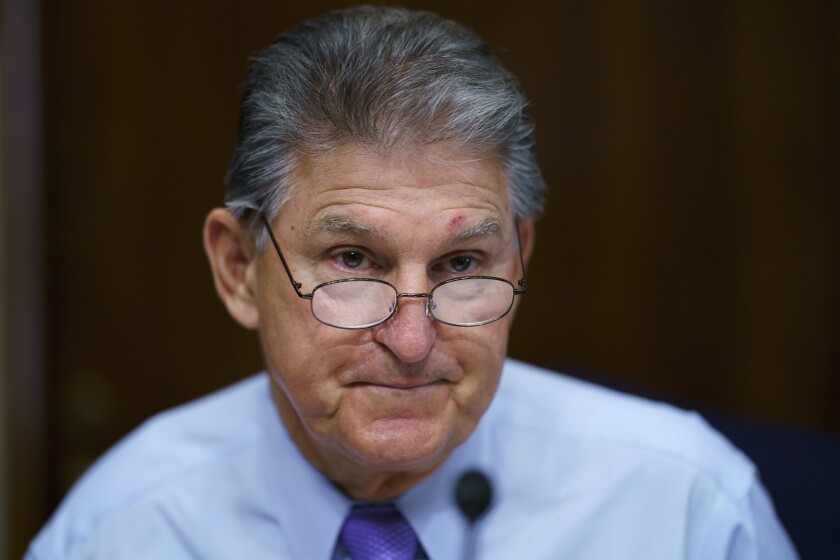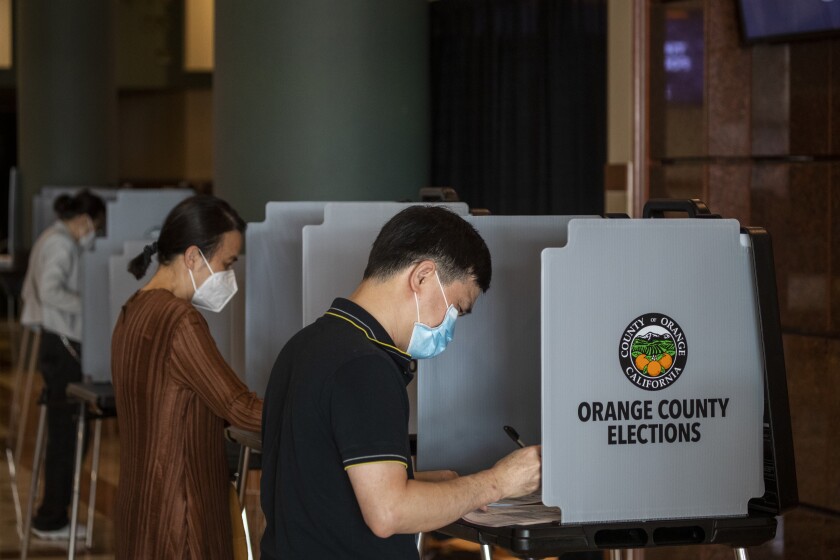Voting rights bill set for Senate vote, showdown likely to amp up pressure to end filibuster

A bill to establish election day as a public holiday and create minimum standards for nationwide voting access is expected to die in the Senate on Wednesday afternoon, a move likely to intensify pressure from progressives on Democratic leaders to eliminate the filibuster.
The Freedom to Vote Act, which would also create a pathway for challenging new voting laws in federal court and requires additional disclosures of campaign spending and fundraising, was widely seen by advocates as the best chance to protect voting rights ahead of the 2022 midterm elections. Sen. Joe Manchin III of West Virginia, a key moderate Democrat who opposes abolishing the filibuster, co-sponsored the bill and sought to include provisions that would ensure Republican support.
But as of early Wednesday, the bill does not appear to meet the 60-vote threshold needed to bypass the Republican filibuster and end debate, which would then allow the legislation to move to the Senate floor where Vice President Kamala Harris could cast the deciding vote in the evenly split chamber.
Senate Majority Leader Chuck Schumer of New York on Tuesday said the bill “would fortify our democracy, protect the vote, and renew the American people’s trust in our elections.”
In a letter to colleagues last week, Schumer applauded Manchin for reaching across the aisle, saying he has “been engaged in conversations with our Republican colleagues in hopes of advancing solutions on a bipartisan basis to ensure all Americans have their voice heard in our democracy.”
Schumer said he was hopeful Republicans would “come to the table to have [a] conversation and at the very least vote to open debate.”
Senate Minority Leader Mitch McConnell (R-Ky.), however, in a statement last week called the bill “unprecedented partisan power to micromanage elections across America” and that it “will go nowhere.”
Since the Supreme Court in 2013 gutted key components of the 1965 Voting Rights Act, Democrats have sought to pass federal legislation that would regulate state changes to voting procedures and expand access to the ballot box. After then-President Trump’s supporters launched a deadly assault on the U.S. Capitol, motivated in large part by Trump’s repeated false claim that Joe Biden stole the 2020 election, dozens of Republican-controlled state legislatures proposed new restrictions limiting voting access, citing the need for “voting integrity.” Their push came despite there being no evidence of widespread voter fraud. Experts say the new laws disproportionately impact people of color.
Among the new laws, in Texas, a measure will make it illegal for local officials to send unrequested mail-in ballot applications, limit early voting and vote-by-mail options and expand the autonomy of partisan poll watchers inside voting centers. Florida, meanwhile, has also moved to restrict vote-by-mail options, as well who can collect ballots, and when and where drop boxes can be used. In Georgia, a law now enables the state elections board, which is currently controlled by Republicans, to take over local election offices and remove and replace election officials.
This state-level effort led House Democrats to pass broad bills that would seek to override some of the new restrictions by protecting same-day registration and vote-by-mail provisions, implementing a national voter registration system and independent redistricting commissions, and by requiring states to get approval from a federal court or the Justice Department before changing practices that might affect voting rights. One of the bills, the For the People Act, also went further, requiring presidential nominees to disclose tax returns, and seeking an overhaul of campaign finance reform.
Manchin was not on board with many provisions in these bills; and Senate Democrats, who cannot afford to lose even one party member, sought to salvage their party’s agenda by passing a scaled-back compromise bill that included provisions, like setting standards for state voter identification requirements, to win his and some Republicans’ support. Unlike the House’s John R. Lewis Voting Rights Advancement Act bill, the Senate legislation does not require states to pre-clear changes in voting procedures.
Democrats are set to consider two voting-rights bills: the sweeping For the People Act and the narrower John Lewis Voting Rights Act.
McConnell said the Manchin endorsed bill is a repackaging of the House bill and that it is “only a compromise among [Democrats].”
“It is not a compromise for the left and the far left to discuss how much power they should grab,” McConnell said.
Ben Jealous, president of People for the American Way, a progressive advocacy group, called for the end of the filibuster, before being arrested at a demonstration in front of the White House on Tuesday afternoon.
He urged Biden to “step up, or voting rights will die on his watch,” adding, “Vice President Kamala Harris and [Schumer] have done their job. They have a consensus. They have 51 votes. They have enough to pass. And in America, majorities should matter.”
“Hey, Joe,” Jealous said, “the filibuster must go.”
Sen. Angus King, an independent from Maine, told MSNBC on Tuesday that like Manchin, he is concerned with eliminating the filibuster to pass policy.
“But to me, this [voting rights bill] is a whole different category,” King said. “If I have to choose between democracy and a Senate rule, that’s a pretty easy call, I think.”
Debate on a federal voting rights bill comes as Republicans in dozens of states push legislation that would make it harder for many Americans to vote.
On Tuesday, Biden, spoke with bill co-sponsors Democratic Sens. Raphael Warnock of Georgia and Alex Padilla of California. Vice President Kamala Harris spoke by phone with King and Democratic Sens. Jon Ossoff of Georgia and Amy Klobuchar of Minnesota about what a White House official is calling a “must-pass priority.”
White House Press Secretary Jen Psaki said that if the vote fails, “Democrats would have to determine an alternative path forward.” Psaki declined to detail what that path might look like. Biden opposes abolishing the filibuster.
Atty. Gen. Merrick Garland in June vowed the Justice Department would scrutinize new state laws “that seek to curb voter access, and where we see violations of federal law, we will not hesitate to act.” The department in June challenged a new Georgia law in federal court on the grounds it discriminates against Black voters.
Get our Essential Politics newsletter
The latest news, analysis and insights from our politics teams from Sacramento to D.C.
You may occasionally receive promotional content from the Los Angeles Times.






